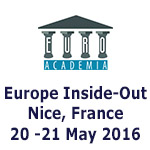Euroacademia Conferences
 Europe Inside-Out: Europe and Europeanness Exposed to Plural Observers (9th Edition) April 24 - 25, 2020
Europe Inside-Out: Europe and Europeanness Exposed to Plural Observers (9th Edition) April 24 - 25, 2020 Identities and Identifications: Politicized Uses of Collective Identities (9th Edition) June 12 - 13, 2020
Identities and Identifications: Politicized Uses of Collective Identities (9th Edition) June 12 - 13, 2020 8th Forum of Critical Studies: Asking Big Questions Again January 24 - 25, 2020
8th Forum of Critical Studies: Asking Big Questions Again January 24 - 25, 2020 Re-Inventing Eastern Europe (7th Edition) December 13 - 14, 2019
Re-Inventing Eastern Europe (7th Edition) December 13 - 14, 2019 The European Union and the Politicization of Europe (8th Edition) October 25 - 26, 2019
The European Union and the Politicization of Europe (8th Edition) October 25 - 26, 2019 Identities and Identifications: Politicized Uses of Collective Identities (8th Edition) June 28 - 29, 2019
Identities and Identifications: Politicized Uses of Collective Identities (8th Edition) June 28 - 29, 2019 The European Union and the Politicization of Europe (7th Edition) January 25 - 26, 2019
The European Union and the Politicization of Europe (7th Edition) January 25 - 26, 2019 7th Forum of Critical Studies: Asking Big Questions Again November 23 - 24, 2018
7th Forum of Critical Studies: Asking Big Questions Again November 23 - 24, 2018 Europe Inside-Out: Europe and Europeanness Exposed to Plural Observers (8th Edition) September 28 - 30, 2018
Europe Inside-Out: Europe and Europeanness Exposed to Plural Observers (8th Edition) September 28 - 30, 2018 Identities and Identifications: Politicized Uses of Collective Identities (7th Edition) June 14 - 15, 2018
Identities and Identifications: Politicized Uses of Collective Identities (7th Edition) June 14 - 15, 2018
Europe: Décadence et élan. Images of the Eternal Return of Abendland
-
-

-
Presentation speakers
- Marta López-Marcos, Universidad de Sevilla, Spain / TU Delft, Netherlands
- Carlos Tapia Martín, Universidad de Sevilla, Spain
- Download presentation
Abstract:
In one occasion, the German sociologist Ulrich Beck asserted that if Europe applied for membership in the European Union, its application would be dismissed. Such are the deficiencies that it maintains and further demands. Recognizing in this idea a certain influence of Toynbee, the conditional proposed by Beck expresses the contradictory loop of optimism and pessimism, negativity and positivity; a permanent crisis in which this space is subsumed. Even if the image of the West as a mythical space of plenitude has been recurrent in diverse thoughts and philosophies throughout history, it was Hegel who tried to articulate the path that the spirit follows; the curve of shadow that draws the course of the sun from East to West, as longing for the wandering in European land of that who lives coming to an end. Decadence appears as wandering, as a detachment, a cultural process that runs in the form of its own eviction, its impropriety: Europe is the Abendland, where everything ends only to start again. This paper aims at exploring the spatiotemporal construction of Europe through its cyclical, (non-linear and non-symmetrical) self-conscience within a perpetual state of crisis; always in counterposition with the Other (or its Others), as the Abendland, following Marramao and Merleau-Ponty, only exists because of the projection of its gaze towards the East. Following a series of images, from the decadent Venetian paintings of the Tiepolos to the artificial suns of Laurent Grasso and other contemporary artists, we seek to unveil the intertwined forces of décadence and élan – which could be translated as “impulse”, “momentum” or “vigorous spirit” – that configure the becoming of Europe. These images, reflecting the moment of crisis, are especially relevant for the spatialization of a Europe immersed in negativity, as they reverse the rhythms of a linear conception of progress. Instead, they show a repeating cycle that keeps the unfinished European project in permanent becoming.
-
Related Presentations













